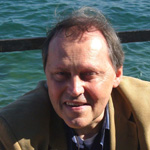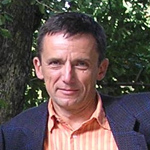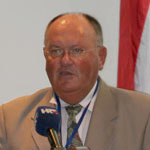Call for Papers
Important Dates
Keynote Speakers
Special Sessions
Paper Submission
Technical Program
Registration
Venue
Travel Information
Accommodation
Committees
Sponsors
ELMAR History
KEYNOTE SPEAKERS
|
Into the Cloud of the Unknown - What strategy Mr. David Wood Deputy Director |
|
The Role of Multimedia in Intelligent Prof. Gregor Rozinaj Faculty of Electrical Engineering |
|
Digital Dividend – Prof. Borivoj Modlic University of Zagreb |
Into the Cloud of the Unknown - What strategy and research agenda for Europe in 'new media'?
Mr. David Wood
Deputy Director
EBU Technical Department
European Broadcasting Union
Geneva, SWITZERLAND
Abstract:
There is an old proverb “any road is the right one - if you don’t know where you are going”. How far does this apply to research in general, and to strategy for the media? What is the right entry point and direction into the ‘cloud of the unknown’? The technology future is a system with a huge number of variables and inter-relationships between them. We cannot predict the future with certainty, but we can identify trends and tendencies (the ‘attractors’ of a mathematically chaotic system). And there are not just technology trends to consider, but business and procedural trends as well.
Among the trends for media is the long march to higher technical quality, enabled by Moore’s law in consumer electronics. Working with Japanese colleagues, we have already tested in Europe an Ultra High Definition Television system, which brings 32 times the definition of 720p/50 HDTV. The viewing experience is very powerful. Many in Europe are looking at 3D-TV, and there are even plans to broadcast a rudimentary form (‘1st Generation 3D-TV') in the near future. There is much research on second generation 3D systems – ‘multiview’ and ‘Integral TV’. Ahead lies decades of research into methods of recording an ‘object wave’, which will bring a ‘natural vision’ media experience to the public. The enabling technology for many of these will be ever more intelligent content-adaptive digital compression. How many MPEGs and JPEGs will we eventually see?
All of these systems will need to be delivered to the public and distribution means which have the capacity to do so – hundreds of Megabits – will be needed. Many broadcasters see here a conflict today between the wish of network operators and politicians to use current broadcast bands for wireless broadband services. These will be of very limited capacity, and we will inevitably wake up one morning and find them – surprise, surprise - inadequate for the bit rates demanded.
There are many other shaping factors to think about. For example, we may be on the verge of a revolution in standardization organisations and procedures. For decades we have used the international standards organizations – ITU, IEC, ISO, etc – to debate and decide technical recommendations and standards. Now there is a new boy in town – Open Source standardisation. A ‘democratic’ community is set up via Internet which develops collectively a ‘standard’. Many in research are asking whether we should use this method, rather than working through standards bodies, for everything. This is, after all, the age of the Internet Community – but there are disadvantages too.
There no unique technology future, but rather a vast number of futures, and what happens will depend on many events and ideas that have not yet happened. We can gain some guidance from the ‘trends’ of today. One thing is certain is that the future will be like it always has been – exciting, unclear, and to be shaped by creative minds (like yours).
About the Keynote Speaker:
The European Broadcasting Union (EBU) is the professional association of Europe's 75 national broadcasters. David Wood has worked for the BBC, IBA, and EBU in the UK, Belgium, and Switzerland. He was educated at Southampton University in the UK, the Popov Institute in Odessa, and the Harvard Business School in the United States. David is the Chairman of the ITU Working Party 6C, which is responsible in the ITU for content origination, and he has been associated with a number of ITU Recommendations such as Rec. 500, Rec. 601, and Rec. 709. His special subjects at the EBU include High Definition Television, Internet Television, and potential 3D television systems, and is author of papers and articles about them. He has tried to help EBU Members to coordinate research and development for many years.
Keynote Speaker's web-page:
http://www.ebu.ch/en/union/ebu_at_work/david_wood.php
The Role of Multimedia in Intelligent Human Machine Interface
Prof. Gregor Rozinaj
Faculty of Electrical Engineering and Information Technology
Slovak University of Technology
Bratislava, SLOVAKIA
Abstract:
TBD
About the Keynote Speaker:
Gregor Rozinaj was born in 1957 in Bratislava, Slovakia. He received his M. Sc., Ph.D. and Assoc. Prof. degrees in telecommunications from the Slovak University of Technology (STU), Bratislava, Slovakia in 1981, 1990 and 1998, respectively. He has been a lecturer at STU since 1981 in the field of signal theory. He spent a 3 months research stay at University of Canterbury UK in 1991 working on using FPGA for DSP. In 1992-1994 he worked on speech recognition at Alcatel in Stuttgart, Germany. From 1994 to 1996 he was with the University of Stuttgart, Germany. Within the cooperation with IPN Mexico he spent two research stays in Tijuana, Mexico (2001, 2003). He has been also working as a consultant for Siemens Slovakia since 1997. He has published approx. 90 scientific papers worldwide. He has published seven books, e.g. Signals and Systems (Bratislava, Slovakia, STU, 1988), Digital Signal Processing I and II (Bratislava, Slovakia, Faber, 1996, 1997), a chapter in Speech, Audio, Image and Biomedical Signal Processing using Neural Networks (Springer Verlag, 2007). He is a co-author of 6 patents, 3 of them are international. His current research interest is devoted to multimedia processing and human computer interaction. Assoc. Prof. Rozinaj is a member of IET and Chartered Electrical Engineer since 1999, member of IEEE (1998-2004).
Keynote Speaker's web-page:
http://www.ktl.elf.stuba.sk/~gregor/
Digital Dividend – Opportunities for New Mobile Services
Prof. Borivoj Modlic
University of Zagreb
Faculty of Electrical Engineering and Computing
Department of Wireless Communications
Zagreb, CROATIA
Abstract:
In Europe and Africa, the entire Band IV/V (470-862 MHz), allocated to analogue broadcasting services, will not be used after switchover to digital TV transmission. Re-planning of broadcasting networks will exhibit the so called digital dividend, the frequencies no more necessary for DVB-T (SD and HD) and DVB-H transmissions. WRC 07 identified the 790-862 MHz band for mobile in Europe, the Middle East and Africa. The digital dividend is a viable opportunity to extend the coverage of wireless broadband networks in sparsely populated areas, as well as indoors. Mobile broadband technologies, such as HSPA and LTE, can do for broadband availability what GSM did for voice. EU is driving a bloc-wide approach on digital dividend utilization. This is likely to result in major license auctions as the national regulators start allocating the band. The GSM licenses in the 900 MHz range are going to expire in the following years. This fact extends the opportunity for new technology free auctions for the existing GSM band.
About the Keynote Speaker:
Borivoj Modlic received B.Sc., M. Sc. and Ph.D. in electrical engineering in 1972, 1974 and 1976 respectively from the Faculty of Electrical Engineering, University of Zagreb,, Croatia. He is full professor in Faculty of Electrical Engineering and Computing, University of Zagreb, Department of Wireless Communications. He held the positions of faculty vice-dean for two years and head of Department of Wireless Communications for eight years. His academic work has been published in six university textbooks: "Radiofrequency Electronics - Oscillators, Power Amplifiers" (1982), "Radiofrequency Electronics - Modulation and Modulators, Frequency Synthesizers" (1982), "Oscillations and Oscillators" (1991), "RF Power Amplifiers" (1992), "Modulation and Modulators" (1995) and "Mixing, Mixers and Frequency Synthesizers" (1995). The publisher received "Strossmayer Honour" for the exceptional edition of the series of last four books.
His scientific and professional activities have been in the fields of RF power systems, broadcasting, modulation methods and digital communications especially wireless access systems. Recently he has been involved in the research on biomedical effects of electromagnetic fields taking part in experimental human exposure evaluation in telecommunications occupational environments. Borivoj Modlic published outcomes of his scientific activities in more than eighty papers and articles in international and national journals and conferences. He has been a member of AUTOMATIKA journal Editorial Board and Board of Executive Editors from 1991 to 2004.
Borivoj Modlic was a member of the body authorised by the Croatian state for inspection of radio systems and testing their compliance with standards. The Croatian Ministry of Science and Technology has appointed him member of the council responsible for the publishing affairs. Croatian government appointed him member of the national regulator, Croatian Institute of Telecommunications, Board of management from 2000 to 2004. In the period from 1980 to 1989 he was a member of a national delegation at several International Electrotechnical Commission (IEC) meetings.
Keynote Speaker's web-page:


